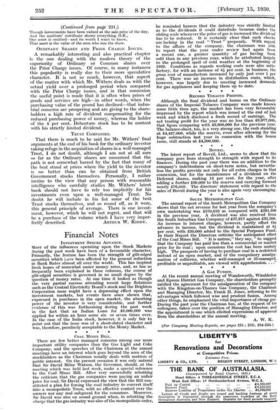COAL MINES BILL.
There are few better managed concerns among our more important utility companies than the Gas Light and Coke Company, and the speeches of the Chairman at the annual meetings have an interest which goes beyond the area of the stockholders as the Chairman usually deals with matters of public interest. On the present occasion it was only natural that Sir David. Milne Watson, the Governor, should, at the meeting which was held last week, make a special reference to the Coal Mines Bill. After very successfully rebutting the criticism that the gas companies were paying an unfair price for coal, Sir David expressed the view that the Bill con- stituted a plan for forcing the coal industry to convert itself into a monopolistic Trust, with no effective control over the owners nor any real safeguard for the consumer. Moreover, Sir David was also on sound ground_ when, in rebutting the charge that the gas industry was also of the monoPoliStiC order, he reminded hearers that the industry was strictly limited as to the dividends it, could distribute because under the sliding scale whenever the price of gas is increased the dividend has to be reduced. It is certainly clear that such checks 'are lacking in the 'coal " Trust ' proposals. With regard to the affairs of the company, the chairman was able to report that the year under review had again been a record one, a greater quantity of gas having been sold than in any previous year, which he attributed largely to the prolonged spell of cold weather at the beginning of 1929. Conditions as regards working costs were also satis- factory, for with an increase of 4/ per cent. in business, the gross cost of manufacture increased by only just over 1 per cent. There was an increase in distribution costs, which, however, was largely due to meeting increased demands for gas appliances and keeping them up to date.










































 Previous page
Previous page